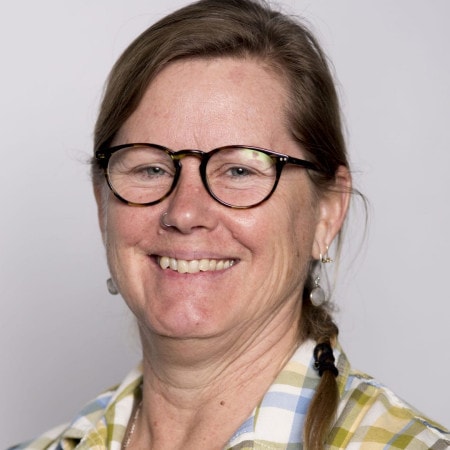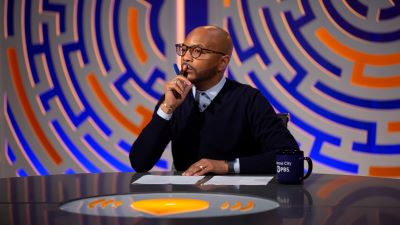‘Passing The Baton’ Aims To Inspire Future Generations By Sharing KC History Standing on the Shoulders of Giants
Published February 16th, 2023 at 6:00 AM
Above image credit: Carl Boyd introduces each segment of "Passing the Baton" with an explanation of the quote. The series was filmed at the Black Archives of Mid-America. (Courtesy | Sandy Woodson)Those close to Carl Boyd like to say that he was born with the gift of faith.
Not just a religious faith, but a faith that tomorrow will be a better day.
Central to Boyd’s belief is the notion that the leaders of today will pass on their knowledge and hard work to empower the leaders of tomorrow to reach their potential.
Boyd’s ethos is baked deeply into the new Flatland digital series “Passing the Baton.”
The project has been in the works for years, but the concept of passing the baton dates back even further.
A series of short videos, “Passing the Baton” highlights the histories and accomplishments of prominent Kansas City civil rights leaders. Their stories are told through interviews with a “baton recipient,” someone younger doing similar work in the community today.
“When I think in terms of the significance of something called ‘Passing the Baton,’ I am saying seriously, that it can actually result in a reduction of violence in our community, because the respect for our community will grow when you see who is placing their trust in you,” Boyd said. “When I pass this baton, I expect more of you.”
Boyd is a longtime urban educator who has dedicated decades of his experience to Kansas City. He partnered with Sandy Woodson, a regional-Emmy nominated independent producer who is similarly dedicated to preserving Kansas City history.
Origin Story
Boyd can trace the concept of passing leadership skills to the next generation all the way back to his childhood in the Ida B. Wells housing project on the south side of Chicago.
In the segregated community, Boyd grew up around tough gang members, lawyers and teachers who, despite their differences, shared the social acuity of empowering the younger generations.
“When I was 12 years old, if one of the really tough guys whom I was imitating, saw me trying to be cool, they would say to me, ‘Come here. You are too smart to act like that, and if you keep on, I’m gonna tell your mama,’ ” Boyd recalled.
“When I was growing up on what was supposed to be a dangerous neighborhood, was not dangerous to all of us because of the informal passing of the baton.”
Fast forward to the mid 1980s in Kansas City. Boyd hosted a public access television show (which would later become his “Generation Rap” radio show on KPRS) and a colleague remarked that his generation did not do a good job at passing the baton and teaching the younger generation.
“So, all the way back then I’m thinking of this baton passing situation,” Boyd said.
Later, community leader Leon Dixon, co-founder of the W.E.B. DuBois Learning Center, would share the Stan Wright quote about passing the baton that appears at the beginning of each “Passing the Baton” video.
As Boyd further developed the idea of a formalized passing of the baton, he honored Dixon and called it “Leon’s Baton.”
Boyd has staged several passing the baton ceremonies throughout his career, one live on the radio, another with an in-person ceremony in 2013.
Folks involved with the ceremony and Boyd himself knew there was more to be done with the concept.
When Boyd brought the idea to Kansas City PBS in 2020 and partnered with Woodson, the idea was to document the stories of the influential individuals he had met throughout his life.
“Now, it is absolutely foolish of me to think that this is the only vehicle available to these people who have acquitted themselves nationally, and in some cases internationally,” Boyd said of preserving the histories through the project.

His goal was not to just tell the stories of these folks, but to let them tell the stories in their own words while they were still able..
As the project evolved between Boyd and Woodson, they came up with the idea of telling the stories through interviews with a baton recipient.
Some of the subjects had direct, literal baton recipients like Alvin Brooks and Diane Charity. Other guests were paired with younger generations who serve in similar fields.
“Here’s the work that I’ve done, take it and move it forward, just continuing on the work,” Woodson said of how she thought about the project.
Why Now?
Time did not stand still during the planning phase of the project.
“In the beginning, we had this list and like every three months somebody was dying,” Woodson recalled. “It was just like, this is ridiculous. We need to get these stories recorded.”
But aside from the battle against time, Boyd saw a series of issues plaguing Kansas City that, in his opinion, could be helped by better baton passing.
“So much of what our young people have been exposed to is from a historical perspective, less than their potential suggests,” Boyd said.
At time when there are intense discussions of critical race theory or the presence of guns in schools, a rise in homicide rates, and plans to close public schools in Kansas City, Boyd said it’s a “critical” time.
“My passion resides in the reduction of violence not as an act in and of itself, but there being purpose in reducing violence based upon your knowledge of how great your potential is,” Boyd said.
Show folks a positive example of leadership and community action and inspire them to build upon it.
The dream, Boyd explained, is to have a positive expectation.
“Is there a point at which we honestly believe we can overcome the violence or the illiteracy, or (live) in communities that are clean, that are progressive, that are peaceful?” Boyd asked.
Like Alvin Brooks, who appears in the first installment of “Passing the Baton,” and started the AdHoc Group Against Crime, Boyd said these solutions should be viewed as temporary. Eventually, a crime group or a tenant’s group won’t need to exist because the problem has been solved.
‘Passing the Baton’: Alvin Brooks
It’s a lofty goal — but Boyd did admit he had the “gift of faith.”
“Dear God, thank you for everything you did for me tomorrow,” Boyd said is his prayer.
“The gift of faith I am suggesting to you, not by passing the baton ceremonially in and of itself, but having enough positive likenesses, conversation, dialogue, examples put before somebody who looks like you for there to be a positive outcome that grows and grows and grows,” Boyd said.
Amen
In 2013, when Boyd hosted a passing the baton ceremony at Central Christian Church, he included a call and response part of the program, a familiar practice in Black churches.
The series, in a way, is a call to the community. It asks folks to respond and carry on the work.
“This is a baton of trust, you don’t have to become me, but the idea behind passing the baton is to say, be more better than I, in the realm where you are most comfortable,” Boyd said.
Woodson noted a line between Brian Hullaby and Diane Charity that didn’t make it into the final cut.
“At one point he said something about, ‘We’ve been standing on your shoulders, and I see that you guys are tired. You’re ready to have us take this on and move forward with it.’” Woodson recalled.
‘Passing the Baton’: Diane Charity
Boyd, a lifelong educator, knows that the way to reach people is not by ordering them, but by inspiring them ahead.
“A strong leader is not successful, unless causing others to follow. A strong teacher is not successful, unless causing others to surpass,” Boyd said.
It fits with the baton metaphor too. In a relay, the baton is handed forward, not backwards.
“If I were to hand off the baton, it is not to say, I want to hand off the baton so you will follow me,” Boyd said. “The person reaching back is the person grabbing the baton, so the young people have a responsibility to do better than those who were before them.”
Subsequent installments of ”Passing the Baton” will be published on Mondays on Flatland and will air periodically on Kansas City PBS.
Boyd, who has gathered an extensive list of baton passers, is continuing the story in a future series titled “Archives Alive.”
Tune in to “Flatland in Focus” tonight at 7 p.m. on Kansas City PBS for more conversation around mentorship in Kansas City.
This article has been updated from a previous version to correct a spelling error.
Cami Koons covers rural affairs for Kansas City PBS in cooperation with Report for America. The work of our Report for America corps members is made possible, in part, through the generous support of the Ewing Marion Kauffman Foundation.



